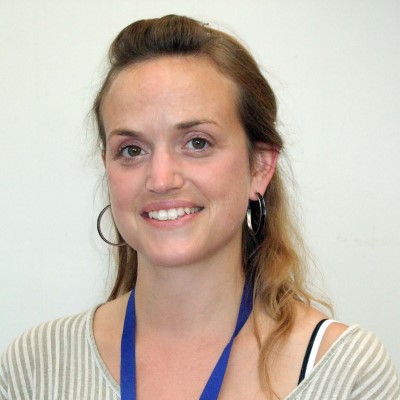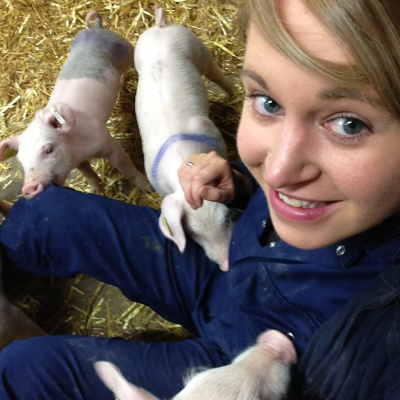CIEL | Meet the Scientist
Dr Amy Taylor
Lecturer in Animal Health and Nutrition

What project/s are you currently working on?
My research focuses on sustainable pig production, maximising nutrient availability and feed efficiency through diet manipulation such as changes in diet composition and the addition of enzymes.
My current research focuses on:
- Zinc Oxide (ZnO) alternatives and maintaining piglet health by controlling piglet diarrhoea during the weaning transition. With the imminent ban of ZnO in June, there is an increased pressure to find alternative feed additives that maintain current high levels of pig production and health, especially in the first two weeks post-weaning.
- The effect of marketing strategies on individual feed intake, growth performance and feed efficiency of pigs in a pen. Removing the heavier pigs in order to attain a specific narrow weight range at slaughter allows the lighter pigs more time to reach slaughter weight. The automated technology at the National Pig Centre allows us to monitor the remaining pigs on an individual basis so that we can identify how such hierarchical disruptions effect the remaining pigs, and how best we can support them in reaching the target slaughter weight.
What capability are you drawing on to deliver the research?
The National Pig Centre at the University of Leeds contains precision feeding systems and 24-hour CCTV camera monitoring that enables us to track individual pigs from weaning through to slaughter. The facility allows me to carry out in-depth, nutritional trials that monitor individual feed intake, growth and efficiency to understand more about a pigs individual requirements, and how best to tailor diets and the management of pigs at all stages of production.
Our projects are supported by a large Animal Science group at the University of Leeds, with expertise spanning animal nutrition, health, welfare and behaviour, pig production, systems modelling and data analytics, as well as drawing on the academic expertise across the University including climate science and sustainability, and energy. We have strong industry links and are continually developing partnerships that invaluably support ongoing research and innovation, and ensure our research has commercial relevance and impact.
What would be your ideal research project, assuming no barriers!
To investigate further the use of precision nutrition in pig production. This would include feeding techniques that allow the proper amount of feed with a suitable composition to be supplied to a group of animals or to individual animals. Matching nutrient supply to nutrient requirements reduces feed costs, improves efficiency and reduces nutrient excretion into the environment. Nutrient requirements vary among animals in a population, however there are two main sources of variation 1) variations over time and 2) and variation between animals within the group receiving the same feed . Understanding more about this variation is essential in developing nutritional concepts to estimate individual requirements of pigs in real time.
How did you arrive at doing what you do now?
I developed a love for nutrition and research during my undergraduate degree in Animal Science, where I was involved in a project looking at the removal of antibiotic growth promoters in pig diets. This inspired me to go on to do a PhD in pig nutrition here at the University of Leeds. I then became a Postdoctoral Research Fellow working in pig nutrition for 4 years, followed by a 4 year post as an N8 Agrifood Knowledge Exchange Fellow promoting research in the area of animal science and supporting collaborative activity across the agri-food sector. I then started a lectureship at the University of Leeds in August 2020, in Animal Health and Nutrition.
What do see as the three biggest questions facing our livestock industries in the next 5 years?
I started my PhD at the University of Leeds in 2007, and have seen the pig facility develop and expand over the years as the demand for research in sustainable agriculture has accelerated. The new facilities from the CIEL investment have allowed us to look at performance and efficiency of pigs on a much wider scale and at a more detailed level, for both indoor and outdoor production systems. The technological investment alone has enabled us to collect and manage huge amounts of data which can be related back to the health and performance of the individual pig, which allows for better on-farm management, production efficiencies, and commercially-relevant research and innovation. The unit has increased in size from a 220 sow indoor unit to a 440 sow indoor unit (with a further 220 outdoors), allowing us to carry out robust large scale trials. The National Pig Centre is home to the only outdoor pig research facility in the UK, which is particularly important given that outdoor pig production accounts for over 40% of the UK breeding herd, so it also provides us with a unique opportunity to compare indoor and outdoor production systems and explore sustainable pig farming solutions in its broadest terms.
Find out more about our Founding Research Member, The University of Leeds







